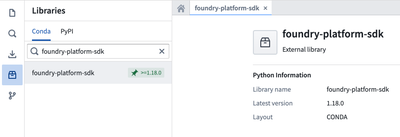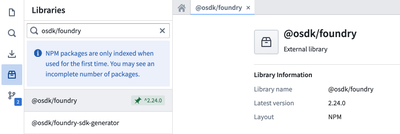Use platform APIs with the Foundry platform SDK
Foundry APIs expose a variety of functionality that you can leverage with the Foundry platform SDK library through functions. You can use the platform SDK to build functions for administrative or governance workflows, interact with schedules and builds, access media sets, and more.
First-class authentication is not supported for TypeScript v1 functions. We recommend using Python functions and TypeScript v2 functions for these workflows.
Install the SDK
To install the Foundry platform SDK, navigate to the Libraries side panel in your code repository and search for the SDK name: foundry-platform-sdk for Python, or @osdk/foundry for TypeScript.


Initialize your client
Your function requires authentication to interact with Foundry APIs. This process involves instantiating an authenticated “client” through which you can make requests to the Foundry APIs through the SDK. In TypeScript v2 repositories, this requires the @osdk/client library, which should be pre-installed. You can verify this by looking for the green pin:

Use platform APIs
Once your function is authenticated, you can start using Foundry APIs. The examples below show how to call a language model or query media sets in both Python and TypeScript:
Copied!1 2 3 4 5 6 7 8 9 10 11 12 13 14 15 16 17 18 19 20 21 22 23 24 25 26 27 28import { Client } from "@osdk/client"; import { Functions } from "@osdk/foundry"; export default async function useLlm( client: Client, // This parameter gets populated by Foundry at runtime prompt: string ): Promise<string> { const promptMessage = [ { role: "USER", content: prompt } ]; const result = await Functions.Queries.execute( client, "com.foundry.languagemodelservice.models.gpt41.CreateChatCompletion", { parameters: { messages: promptMessage } }, { preview: true, // Required only for unstable endpoints, see API reference } ); return result.value["completion"] as string; }
Copied!1 2 3 4 5 6 7 8 9 10 11 12 13 14 15 16from foundry_sdk import FoundryClient @function def media_item_to_base64(media_item_rid: str, media_set_rid: str) -> str: foundry_client = FoundryClient() result = foundry_client.media_sets.MediaSet.read( media_set_rid=media_set_rid, media_item_rid=media_item_rid, preview=True # Required only for unstable endpoints, see API reference ) # Convert the binary stream to a base64 encoded string base64_encoded = base64.b64encode(result).decode('utf-8') return base64_encoded
Client permissions
The TypeScript v2 client (passed to the function by Foundry at runtime) and the Python client initialized in code have the following permissions scope:
api:admin-readapi:functions-readapi:ontologies-readapi:orchestration-readapi:usage:mediasets-readapi:usage:ontologies-write
Each platform API endpoint requires certain scopes to hit the endpoint. Documentation on these scopes can be found in the API reference